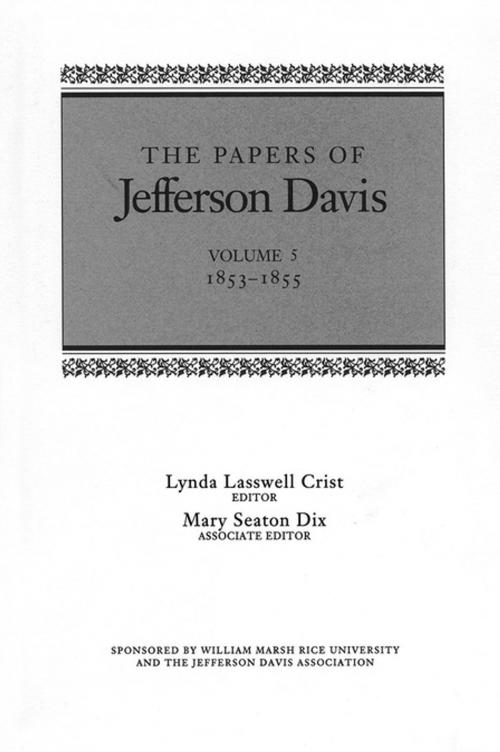The Papers of Jefferson Davis
1853–1855
Nonfiction, History, Americas, United States, Civil War Period (1850-1877), Reference & Language, Reference| Author: | Jefferson Davis | ISBN: | 9780807158746 |
| Publisher: | LSU Press | Publication: | October 1, 1985 |
| Imprint: | LSU Press | Language: | English |
| Author: | Jefferson Davis |
| ISBN: | 9780807158746 |
| Publisher: | LSU Press |
| Publication: | October 1, 1985 |
| Imprint: | LSU Press |
| Language: | English |
Mary Seaton Dix, Associate Editor
The fifth volume of The Papers of Jefferson Davis presents 9,000 of the approximately 21,000 known Davis letters, papers, and speeches from the years 1853 through 1855, when Davis served as secretary of war under President Franklin Pierce. Most of the documents are included in summary form in an extensive calendar; 93 are published in full with annotation.Well prepared for the War Department position by his military education and experience, Davis was already known as a champion of the army and West Point from his years in Congress. As secretary, Davis administered a department of eight bureaus and a military establishment spread thinly from coast to coast. An increase and reorganization of the army along with the establishment of new posts became top priorities as a tide of settlers encroached in Indian lands in the Mexican cession and Far West. Davis also supervised army engineering projects as varied as the Capitol extension, military roads, and river and harbor improvements. The curriculum of the Military Academy, new weapons and armaments development, the activities of the Crimea commission, the Pacific railroad surveys, and the camel expedition -- all commanded his minute attention.Despite the burdens of office, Davis maintained a lively interest in the issues of the day, among them Latin American filibustering, the purchase of Cuba, states' rights, slavery, and the conflict in Kansas. The wide attention accorded his travels and speeches brought national prominence to him and speculation about his future candidacy for governor, a return to the Senate, the vice-presidency, and even the presidency. Personal correspondence includes letters that touch on Davis' long estrangement from his brother, the death of his first child, persistent health problems, and relationships with friends and family. Much of hiss official correspondence, especially several angry exchanges with army officers, reveals even more about Davis' personality. In addition to the documents published in full and calendared, an appendix includes over one hundred recently discovered personal and political items dates from 1838 through 1852, before Davis' selection as secretary of war.
Mary Seaton Dix, Associate Editor
The fifth volume of The Papers of Jefferson Davis presents 9,000 of the approximately 21,000 known Davis letters, papers, and speeches from the years 1853 through 1855, when Davis served as secretary of war under President Franklin Pierce. Most of the documents are included in summary form in an extensive calendar; 93 are published in full with annotation.Well prepared for the War Department position by his military education and experience, Davis was already known as a champion of the army and West Point from his years in Congress. As secretary, Davis administered a department of eight bureaus and a military establishment spread thinly from coast to coast. An increase and reorganization of the army along with the establishment of new posts became top priorities as a tide of settlers encroached in Indian lands in the Mexican cession and Far West. Davis also supervised army engineering projects as varied as the Capitol extension, military roads, and river and harbor improvements. The curriculum of the Military Academy, new weapons and armaments development, the activities of the Crimea commission, the Pacific railroad surveys, and the camel expedition -- all commanded his minute attention.Despite the burdens of office, Davis maintained a lively interest in the issues of the day, among them Latin American filibustering, the purchase of Cuba, states' rights, slavery, and the conflict in Kansas. The wide attention accorded his travels and speeches brought national prominence to him and speculation about his future candidacy for governor, a return to the Senate, the vice-presidency, and even the presidency. Personal correspondence includes letters that touch on Davis' long estrangement from his brother, the death of his first child, persistent health problems, and relationships with friends and family. Much of hiss official correspondence, especially several angry exchanges with army officers, reveals even more about Davis' personality. In addition to the documents published in full and calendared, an appendix includes over one hundred recently discovered personal and political items dates from 1838 through 1852, before Davis' selection as secretary of war.















